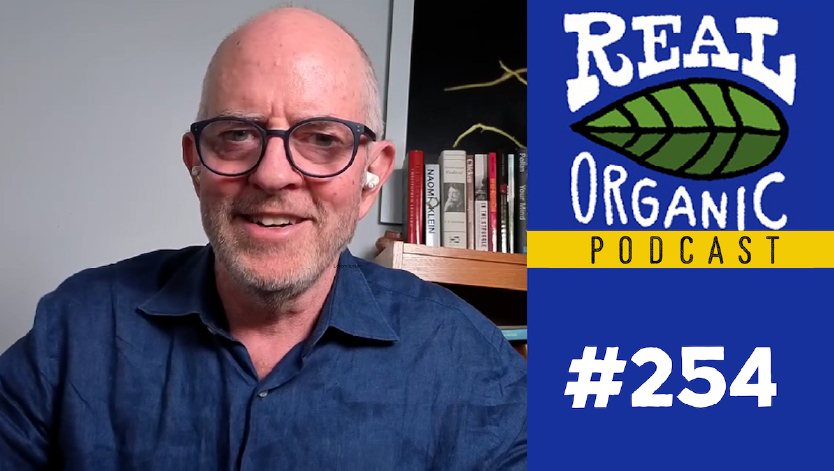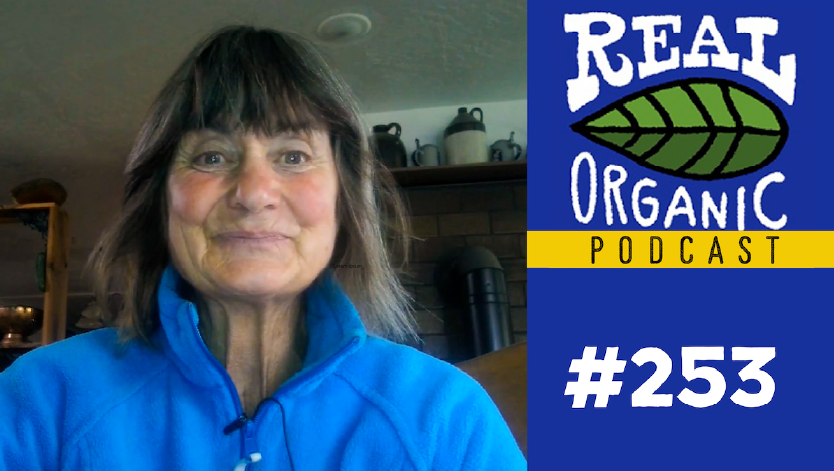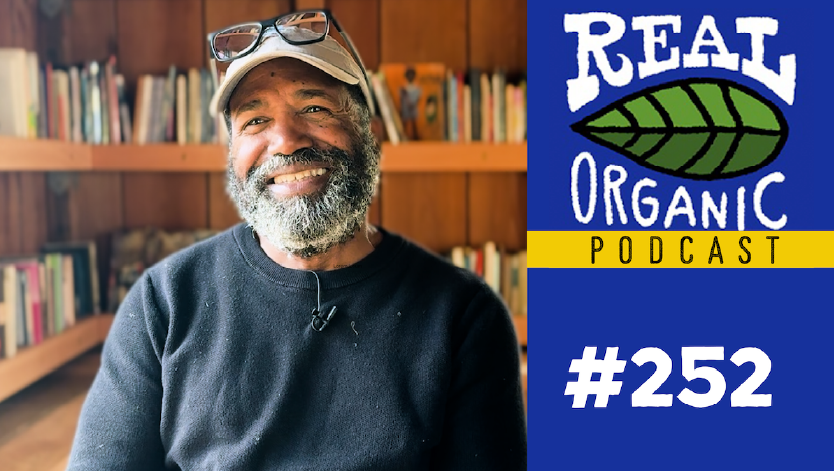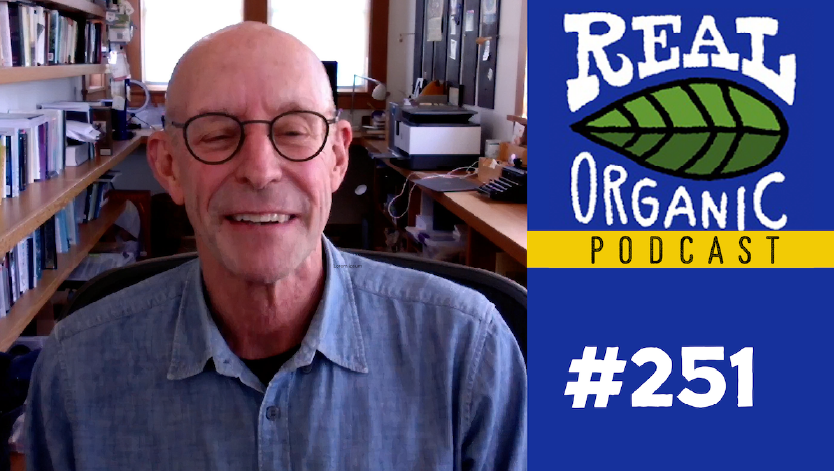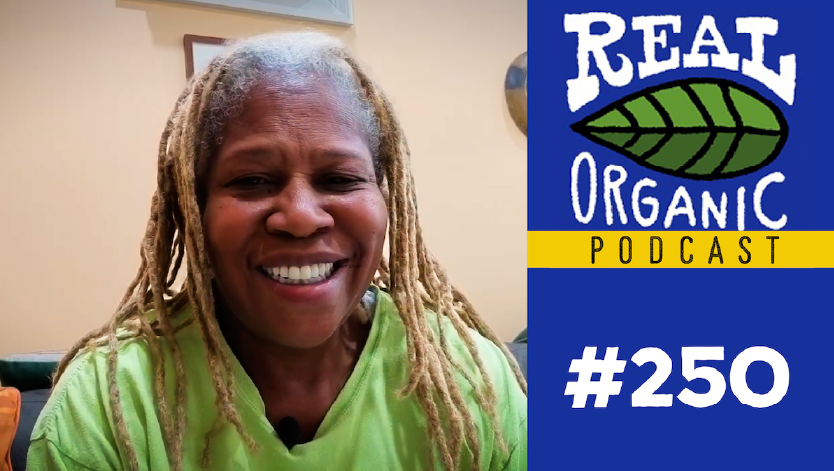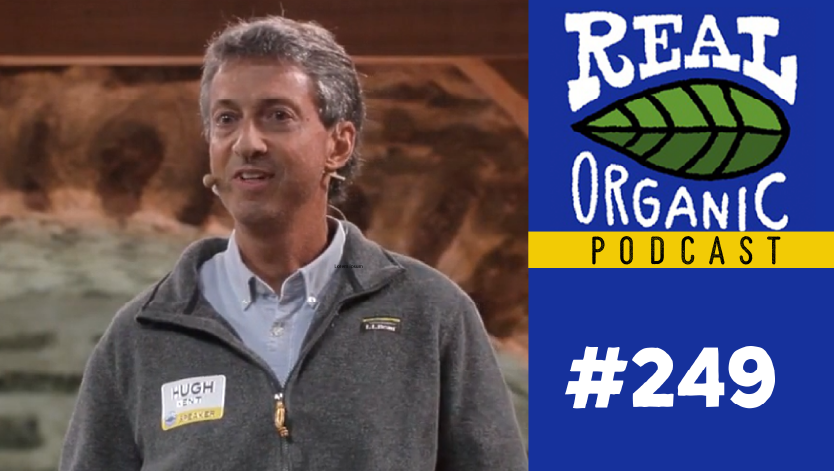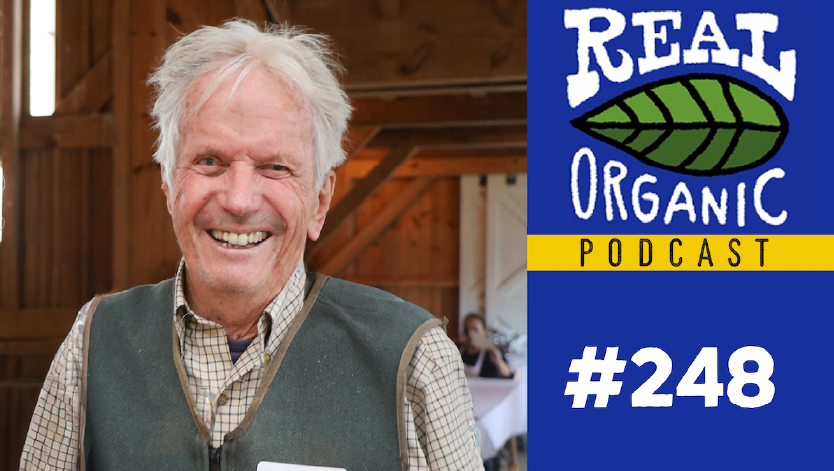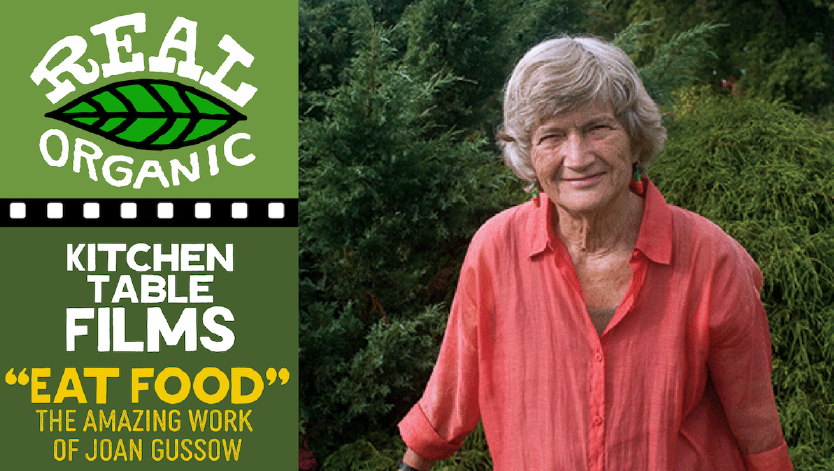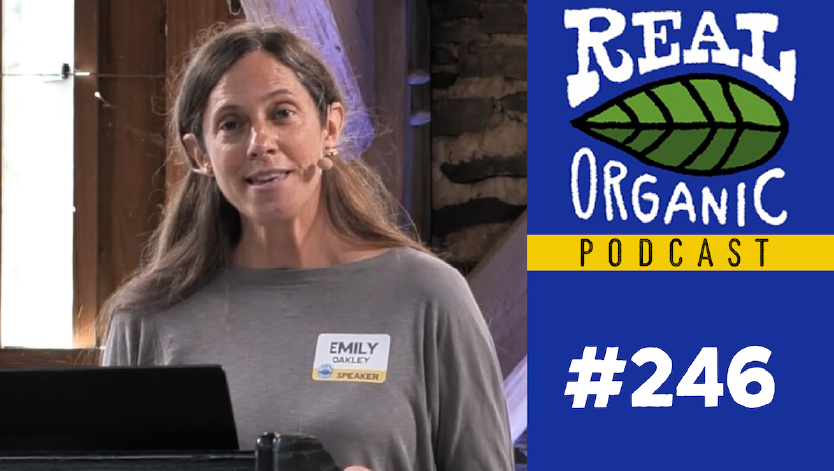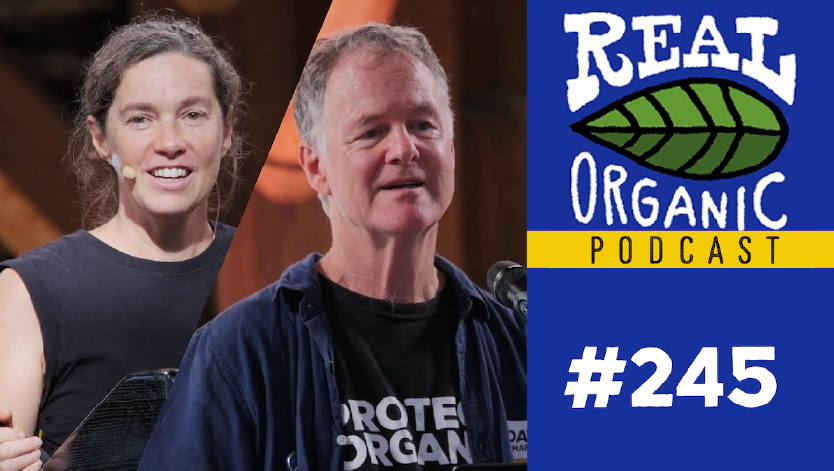Episode #004
Leah Penniman: Revolution Based on Land
Welcome! You can subscribe and download episodes of our show through your favorite podcast app.
You can also subscribe to receive the video version of each episode on our YouTube channel.
Our Leah Penniman interview has been edited and condensed for clarity.
This interview has been edited and condensed for clarity.
Dave Chapman: Welcome to the Real Organic Podcast. I am very happy to be talking to Leah Penniman today. Leah is the well-known author of the book Farming While Black, and I’m going to read something she wrote about herself. She’s also the co-founder of Soul Fire Farm, and she has described herself as a multi-racial, light-skinned, raised rural, northeastern college educated, cisgender, able-bodied, Jewish food and practicing biological mother who grew up working class. So, Leah welcome.
Leah Penniman: Thank you so much for having me. It’s an honor to be here.
Dave Chapman: It’s great to have you, you know, you’re a very important part of the conversation actually. So you, you have on Soul Fire Farm’s website, “All revolution is Based on Land” just to jump in, where did that come from? What does that mean to you?
Leah Penniman: Mm, so we’re starting light. Okay! (I was trying to make it lighten it up. You can leave that in.)
So you know, that quote actually comes from Malcolm X, that “All revolution is based on land.” Land is the basis of freedom, justice, and equality. And what that means to me personally, is that it’s quite impossible for us to have our freedom without having access to land. And, you know, I’ll tell a quick story to illustrate that. So Fannie Lou Hamer was pretty famous for having just walls and walls of, of peaches and canned goods lining her home and the civil rights activists that she mentored would tease her for this and say, we have so much work to do with the democratic party. So much work to do around voter registration. Why are you wasting your time in the garden? And she said, “you know, if you have 400 quarts of greens and gumbo soup canned for the winter, nobody can push you around or tell you what to say or do.”
And I would add that by extension, right? If you have nothing canned up for the winter, as soon as they chain those grocery stores, you’ll put down your Black Lives Matter sign, you’ll put down your ballot, go crawling through the dust to feed your children.
And we’re really seeing that right now in this time of multiple pandemics, where supply chains are disrupted, where the cracks in the industrial food system are laid bare – that free, cheap available food, it’s just not a guarantee. And so in feeling that yearning for food security, I think as a society we get to tap into: Oh my goodness, what must it be like to be part of a people that for generations hasn’t had land, right? Hasn’t had food security? Hasn’t had these basic necessities of life, which are foundational for us to be citizens who are active for us to be truly free.
Dave Chapman: Yeah. I think it was a Walter Jehne who said to me, I guess it was during the Arab Spring, they said 72 hours is all that separates us from complete social meltdown. If you miss miss food for 72 hours, the s—t’s gonna hit the fan. So same idea, the idea that we can do without a lot of things but we can’t do without food. Absolutely cannot do without food.
And you, so you, if we can go to like how you got to that…you grew up, I know you’ve told your story a lot, but I’d really love to hear it. Tell me, you know, how did you come to be interested in, in farming and organic farming?
Leah Penniman: I mean, my interest in the earth and in land really predated my interest in farming. So, you know, as you briefly mentioned in the intro, our family was the only non-white family in our small rural northeastern town. And to say that the children at school were cruel to us would really be an understatement. I mean, bullying was just a norm and peer relationships were very challenging. Relationships with teachers were very challenging.
So my siblings and I found solace in nature, we spent all our time in the woods. We developed this fierce protectiveness around the earth, who we saw as a friend as this intimate friend. So when I turned 16 and was eligible for working and it was time to get a job, I wanted to do something that was in service to the environment. And farming happens to be the available opportunity. I was hired by the food project outside of Boston.
I worked in both urban gardens, as well as a 40 acre rural farm that served food up to people under food apartheid. And there was, there was just a profound homecoming in all of that for me, a profound meaning, and I was hooked. So I just kept apprenticing on farms throughout my young adult life, including Many Hands Organic Farm in Massachusetts, Farm School, ran community gardens with my would be partner in Worcester until I had the skillset to eventually start our own farm, which is Soul Fire Farm, which opened in 2010.
Dave Chapman: Yeah. Yeah. So did you find that, that at that point, when you discovered farming, I know it wasn’t, it wasn’t complete, but it was the beginning of, of a transition for you where you did you start to feel you could breathe more easily. I mean, was this, was this like coming home or, or was it not quite there yet?
Leah Penniman: I mean, there are certainly challenges. I would say that my immediate felt experience of farming, especially in the Boston area with a very racially diverse, economically diverse group of youth. There was an ease in that homecoming.
I think the challenge for me was when I started to take seriously the idea of being a farmer and I was attending all the conferences, you know, the organic farming conferences and regenerative ag / sustainability, and by and large, the attendees were white. Certainly all of the presenters and authors who were highlighted were white.
And I started to have doubts about whether I was somehow being a traitor to, to my ancestors and to my family and my community. And whether my intelligence and strength, you know, would better serve my community, focusing on an issue like, you know, disparities in education or housing reform or so on. And it was a mentor of mine who who’s actually now the president of our board, Karen Washington, a black farmer in upstate New York who met up with me at one of these conferences.
She was one of the few people of color there and just said, you know, hang on, you know, our relationship to farming as black people is not circumscribed just by slavery and oppression. And they, the beautiful innovations that we call organic, you know, those have roots in our community. And it was just a matter of time until we have our own conference until we have our own book and little did I know that she would create the conference and I would create the book, but it was, it was her encouragement that helped me you know, it really validated my love of farming as a continuation of ancestral heritage and not a negation of that heritage.
Dave Chapman: Yeah. I think what you said is so important. And I actually think that a lot of white people actually don’t understand it, that it’s the nature of privilege that it’s invisible to you. It’s the nature of being a powerful part of a community that you don’t see that you’re powerful.
I’m an old white guy. So, you know, I’m surrounded by a community that celebrates me – well, not so much now, sometimes young people go “Oh, Boomer, you know, look at what you’ve done to our world!” – but I really think that what you said is important: that you didn’t see people that you could identify with.
So it was hard for you to hang your hat on that hook. It’s…am I getting that right? I don’t want to speak for you.
Leah Penniman: Yeah. You know, and I think what you say about how fish can’t see water, right? How privilege is kind of invisible to those who hold it. I think that something that was operating in those spaces as well, was this assumption by the white majority, in these conference spaces that all of these organic farming practices that we celebrate, or either a historical, they just magically appeared, right? Or they were European.
And one of the really important processes of writing Farming While Black, which is really a compilation of the curriculum, the farmer training curriculum that we run at Soul Fire Farm was to uncover the real truth of the sources of these things.
So for example, you know, compost itself, the compost is sort of backbone of our fertility systems on organic farms, Cleopatra was in Egypt, she was the first ever vermicomposter. She was an avid avid defender of worms and actually at a whole cadre of priests whose full-time work was dedicated to the study of the biology of these worms.
And you’d, you’d be put to death for harming an earthworm. And I don’t advocate capital punishment at all, but just think of how profound, right, how profound it is that the, this nation state would be defending the worm, you know? And then African Dark Earth is another advanced composting technology in West Africa practiced by women in Ghana and Liberia. And there, they have an ethos that, you know, every single member of the community is responsible for adding to these layers of, of black earth of compost. And they, if you take a soil core, you could measure the age of the community by the depth of that soil, just like you’d read rings of a tree and imagine an ethic like that, where, where we, as Westerners, would be so committed to making the earth better, that you could measure the age of our civilization by the depth of its rich soil?
And it goes on, whether you’re talking about cover crops, rotational grazing, raised beds, terraces, what we now call permaculture like these are African indigenous technologies. And so it was a very important part of, of writing the book and establishing Soul Fire to establish on a true narrative that really uplifts the contributions of Black and Brown people to feeding the planet without destroying it.
Dave Chapman: Yeah, and, and spreading the word of that. So it’s really interesting to me. I was just interviewing Eliot Coleman, and you mentioned him in one of your interviews actually as somebody you were inspired by, but you know, you still didn’t find the model for you, the, the place where you said, “well, what’s my role in this” until you look towards the history of Africa, farming in Africa, and then you felt very differently about it and you, you kind of brought that message to a lot of people.
Leah Penniman: Yeah, absolutely. There’s an ethos in the black community called Each One Teach One, the sense that once you know something it’s immediately your responsibility to pass it on. And so, you know, we did not set out to be a training center. We thought our family would have our tiny little farm in the mountains and do our duty of sharing the harvest with those who needed it at affordable prices. And that would be plenty, honestly, in terms of workload, but it was, I think we’d been in operation no more than six months and started getting phone calls from all across the country. Some people literally in tears saying, is it really true that there’s, you know, a black woman farming in a rural area and you’re succeeding at it? You know, can I come learn from you? Can you advise me, can you encourage me?
And from there birth the apprenticeship programs, the week-long immersions, the mentorship, the youth camps, all of this, really this beautiful surprise. I mean, who knew that we were at the beginning of a movement of this returning generation of black farmers, of people whose grandparents and great-grandparents fled the red of Georgia and the terrorism of lynching and violence by the USDA being forced off their land. Right?
We are the grandchildren of those refugees who are realizing that something sacred was left behind in those soils and we’re picking it up and carrying it forward. And I will tell you, I mean, we have thousands of people come through every year (when it’s not a pandemic) and a waiting list of three plus years.
So there is no shortage of interest in folks who want to farm right from these communities. And we’re doing our best to train trainers and, you know, spark the resources that are necessary to meet the need, but it’s been, you know, the most profound and beautiful surprise of choosing to be a farmer in this time.
Dave Chapman: So the reason I thought of Eliot is I said to him, “if you had just chosen to be a farmer and not write about it and not give talks about it” and not do all the many things that he did to really spread the word, it still would have been a great life. And to, to grow on a few acres and to feed people. And if you could make a living at it really, you know, what more could you ask for?
And yet you have gone far beyond that. You have changed, I think, as I understand Soul Fire Farm – I don’t mean you alone, I understand that this is a cooperative effort – but as a group, you have chosen not just to be farmers, which is an honorable, honorable livelihood, but you’ve chosen to be educators and to be social activists. That’s actually a huge step. I think, it sounds like, it just almost was by popular demand. You almost had no choice, but when you went into it, I mean, how, how did that happen?
Leah Penniman: Oh, there’s so many layers into what you just asked. And first of all, I want to say, thank you for highlighting that it’s a team effort. I mean, if anyone tells you they’re farming completely alone, or certainly, you know, doing social activism alone, you should raise an eyebrow.
So, you know, shout out to Justin, Kiani, Jonah, Theresa, Nyima, Cheryl, our whole team. It’s definitely a team effort and I would be remiss also not to mention that both my parents are activists. So my mother Reverend Dr. Adele Smith Penniman was very active in the civil rights movement with voter registration in Alabama. Side-by-side with Dr. King. My father also was very active in the civil rights movement and the conservation movement. So it was never an option to not be an activist – that was always infused. And originally, you know, our farm was started in response to the yearning of our neighbors to be able to have fresh food in the south end of Albany, right.
We were living under food apartheid, no grocery stores, no farmer’s markets, no available community gardens. It was a struggle, even for us to feed our young children because without a car or a bus line and not a lot of disposable income, you know, where do you get that food? So it was our neighbors who said, when are you going to start the farm? So that was the original ethos.
It was like, okay, well, how do we create a business model that makes sure that everyone who needs food can access it and the farmer can make a living? So we came up with this sliding scale model, “solidarity shares”. And so on the education piece, you’re right, that was certainly by popular demand. We didn’t anticipate more than a few school field trips. Certainly didn’t anticipate a returning generation of farmers, and something I love about Soul Fire is that each step of the way it has really been accountable to a spoken community need.
It’s not like we said, you know, “I really think I know what the world needs, and I’ve decided in my small mind,” but, you know, I have some omniscience, you know? Our graduates of the program came to us and said, “well, now we know how to farm, but we don’t have any land.” You know, farm workers in the community who we’re getting to know were saying, “well, how come your programs aren’t in Spanish and how come you’re not advocating for farm worker rights?” We’re the farmers of color here. Right?
And so it was these calls to action that continuously caused us to expand the concentric circles of what we do. And we are active. We’re very engaged in policy. We’re very engaged in advocacy, public education, reparations, work, land trust, financial vehicles. So all of these structural elements, in addition to the, you know, harvesting squash that I just came in from 10 minutes ago.
Dave Chapman: Yeah. So let me ask you a personal question. I mean, I know that you have been working hard on the speaker circuit, you know, after your book came out. I know that it’s pretty exhausting to be out there. You know, and I can imagine that maybe there was a blessing in COVID for you because, you know, you got to take a break and be out farming. How do you feel about that? Do you get fed by going out and speaking and being so, so in the public eye?
Leah Penniman: Mm, I really appreciate that question. And, you know, I certainly would never celebrate anyone’s like suffering or death or pandemic, but I was very fortunate in that my 18-month book tour was in month 17 on March 11th. So I was able to travel to speak, to meet people.
I think the highlight of the book tour was not necessarily the big auditoriums, but the opportunity to visit our sibling farms in the small outlying towns and urban spaces around those big auditorium. So I feel really blessed.
And as you’re alluding to, I am the most introverted person I know. I really am. I could go days and days and days without talking to any human being and be perfectly content cause I can talk to trees and birds and deer and I would be just fine. And so being here on the lands, I mean, I haven’t slept in another place in months and that intimacy with, you know, every thing – of the drying of the Hazelnut that I witnessed, and every step of the opening of the Calendula through its seed cycle. Seeing the day by day has been, has been just a profound blessing.
And so I’m, I am grateful to be here and grateful to be a farmer in this time.
Dave Chapman: Yeah. Yeah. You know, taking time out is talked about for people who are caretakers, the needs to take care of themselves. And you know, Bill McKibben alluded to that saying, “you know, if I hadn’t passed this off to a younger generation, to some degree I would have died” cause he was traveling so much and it’s exhausting.
But you know, the message that you’re sending has been very important. I see that to people there’s a joy that you’re out there saying this. And tell me, first of all, tell me how close are you to Albany? How close was Soul Fire to Albany, where you stayed?
Leah Penniman: So we are on Mohican territory, 80 acres in Grafton in Rensselaer County. So that is 35, 40 minutes from Albany and about 20 minutes from a smaller city of Troy, New York. So, you know, we’re not so far from civilization. But I do see bears most days.
Dave Chapman: Okay. Well that counts, you get points for that. And so you really are able to take food back to the people in the community where this kind of all started. Did you start as an urban farm? Did you start first by growing vegetables in Albany?
Leah Penniman: No. I mean, I had, once I was able to cajole my way into the community garden, I had a community garden, but no, we’ve always been a rural farm which is often a misconception. People think, you know, well for various reasons and I’ll leave my assumptions aside, that we must be an urban farm, but no we’re 80 acres completely rural. The Trump flags are flying all in all directions out here.
And our model, which we call “solidarity shares” involves, you know, boxing up all of our harvest. So that’s vegetables, fruits, value-added, eggs, pasture-raised meat – every Thursday into the van. And then we do a doorstep delivery program where people pay what they can afford. In a typical year, we’ll aim to have about half of the members of that CSA be paying above-market value, some middle income folks, and half paying sometimes well below-market. So it washes out.
In this year of COVID the demand and the need for subsidized shares was so high that we actually decided to put a hundred percent of our food towards the below-market value community, and then do fundraising to fill the gap in response to that. So we’ve shifted our sliding scale for the duration of the pandemic, but absolutely that’s the idea.
And then we have a few institutional partners as well. There’s the Albany Free Food Fridge projects, Focus Churches, which includes a network of Black-run churches, the Refugee Center and the Victory Bus Project, which works with incarcerated families and their loved ones. So they in turn, you know, they get large sums wholesale from us and then they in turn distribute that to their constituencies.
Dave Chapman: Yeah. So you’re such a model of a community-based farm. Really it’s, it’s so impressive. I’ve seen some other community-based farms that I think have been successful like yours. Javier Zamora (JSM Organics) is a pretty good example of that in California, where really you got a community to come together and buy the land that he farms on because he didn’t have the money to do that.
He’s one of the Real Organic Project farms and when Linley inspected his farm, she said, “you know, I drove around California and I visited all these great organic farms, but it was almost always white people who own the farm and Brown people who worked the land.” And she said, “when I went to Javier’s place, it was a Brown family that owned the farm and the crew was every color that we have.”
And so it was such a striking example of something different going on. The economics were different. You know, I think that it’s very hard to go up against the reigning economic model and compete on their terms and survive.
Leah Penniman: Yes, it absolutely is. And that’s something that we struggle with. I mean, is it disingenuous to be training farmers, professional farmers in a climate where we know how unlikely it is for them to survive economically? You know, these are the things we wrestle with and, and we have to tell people that realistically, if you want to make a living farming and you’re not willing to go up to a minimum of 400 CSA shares without equivalence of scale, right, you’re going to have to have what we affectionately call a side hustle.
So whether that’s your value added, your high-end Green’s market, your agritourism side projects. To make ends meet you really have to be thinking about what is this, this value add. And for us it’s education. You know, we’re able to bring in income through teaching courses and charging program fees and so on, to supplement what comes in for the vegetables.
And, you know, unfortunately there’s a way that farmers sometimes get shamed for that and are considered less legitimate, but there’s so many studies that show at a smaller scale, you know, the, the number of folks who don’t have to rely on some outside income is less than 5% of farms. And so I think it’s more to be offering strategies for how do we bridge the gap until society wakes up and realizes that we need to flip the economic model. So it’s actually possible to value our crops and what they’re really worth.
Dave Chapman: Yeah, absolutely. I believe that the majority of American farmers have to have at least one family member working “out” in order to make it, so there’s nothing illegitimate about that. It’s just the economic reality that we all struggle with. That’s great that you’re teaching that to people.
I have seen some teaching institutes that actually weren’t preparing people to survive the real world and the only thing they were actually learning how to do is to be estate gardeners. God bless the estate garden, but you know, it’s like if you’re going to go out and do something else, how do you survive it?
I’m struck by the fact that for many, many, many farmers, once they have gotten through the first five years, they actually know how to grow food pretty well. It’s business skills that are so limiting and so daunting. You know, how do you make a living in a very tough arena?
Leah Penniman: Yeah, I agree. And I don’t think there’s any easy answers for that, but you know, something that we’ve also come across that echoes and resonates with what you said is, that the farmers in our community by and large are folks of color. They’re Latinex, Hispanic people who are often migrants and are undocumented here on H2A visas. But as far as the people who know the land, know how to work the lands, you know, bend their backs every day, that’s the population.
And so increasingly we’re trying to widen our circle of caring and accountability. And so the past few years we’ve had more programs in Spanish and are adopting our curriculum to what’s needed, and these communities are telling us “yes, farm skills to some extent, but way more.”
So it’s the business skills. How do you navigate the system? How do you access credit? What are those licenses and approvals that you need and certifications that you need? How do you get access to markets, aggregate, grading, sorting all of that. And so we’ve had to rise to the challenge of professionalizing our curriculum. So we’re not just training estate gardeners, right. But we’re really providing pathways for folks who are so-called farm workers, really farm employees to be able to move into management ownership and autonomy.
Dave Chapman: Yeah. That’s fantastic. I’m amazed that you ever have time to sleep. It’s a lot to take on, just to even begin to approach the beast. It’s a big thing.
So one of the things that you have been able to do at, at Soul Fire is to come in and of course get a lot of people just to taste what it’s like to be in a garden. What it’s like to be on the land, what it’s like to feel the earth, but for others, you’ve got them started in actually becoming a farmer. And going forward with that, do you find that most of the people who are being trained in that way, are they from the Northeast? Are they coming from the South and they’re coming from the West?
Leah Penniman: Well, you know, this is such an important question because I think in a time of this pandemic, we’re starting to need to question that. Wou know, where folks are coming from?
So it’s been over 40 States each year that people are coming from to join our programs and they stay for a week. Usually most of our programs that we do are one week. We do have some season-long apprenticeships in cohorts of 20 to 25 for the program. And then once they graduate, they are forever part of what we affectionately call our “farm-ily” so they receive mentorship seed funding and other resources.
And I don’t know what the future will bring. I mean, we’ve moved a lot of our programming online and there are certain disadvantages, especially with such a practical set of skills. And we’ve noticed the ways that accessibility, in terms of language and geography, has increased. And so I don’t know what the future will bring, but I’m imagining we might be in a more hyperlocal world in terms of our hands-on and in-person gatherings. And in this diffuse, highly-inclusive world, in terms of our virtual gatherings. So we shall see, but to date, yes, we have alumni all around the country and from several countries as well from, from the UK, from South and Central America.
Dave Chapman: That’s great. Have you seen ..obviously a lot of the black ownership of farmland was focused in the South, the Southeast and Texas.
Leah Penniman: Yes. It still is. It absolutely still is. I mean, for just some context for folks who don’t know the history, I mean, the peak of black land ownership was 1910 at about 16 million acres of land. This was purchased by black people, despite the broken promise of 40 acres and a mule after the end of the civil war. And these little parcels were often quite marginal, you know, two to four acre parcels of undesirable land, yet still it represented such a threat to the status quo because any land owning black farmer was not a sharecropper and therefore not on the plantation.
So the backlash against this was really severe. I mean, the white citizens council, the Ku Klux Klan, the white caps, they lynched black farmers and stole their land. The USDA was actively colluding with this and denying black farmers loans and allotments and crop assistance.
So Black land ownership, farmland ownership has declined to just over one percent of the nation’s farms with almost all of that concentrated in the Southeast and central parts of the United States. There’s almost, there’s just over a hundred black farmers in the entire state of New York. So it’s infinitesimal and we’re organized and we’re working hard to change that.
But the focus of resources really needs to be, I believe in the Southeast where the black farmer is still trying to hang on. And now we’re confronting these corporate land grabs by retirement companies like TIAA and heir property. Heir property exploitation, where corporations try to get one of many heirs to sell their allotment in for sale. So there’s this, all this horrible stuff going on that threatens this last vestige of black farm land in the Southeast.
Dave Chapman: Yeah. I I’ve been told that there’s a similar land grab going on right now in Africa. A lot of Chinese companies are moving in and doing their best to gain control of vast tracks of farm land. So it’s not just an American problem.
Leah Penniman: And it’s completely horrifying. And I don’t think we’re paying attention and we’re going to wake up in half a generation and say, “Oh my goodness, the water, the minerals, the soil, the trees – the very natural resources upon which all life depends are in the hands of a few hyper wealthy corporations. And we slept on it. And we slept on it and we can’t let that happen. I mean, it circles back to your first question. Land is the basis of revolution. Land is the basis of everything, right? Who are we without land?
Dave Chapman: Yeah. It’s amazing that that came from Malcolm X, an urban dweller all his life. Right. But, but he was seeing that. So let’s talk about George Washington, Carver.
I love George Washington, Carver, and you know, somebody once told me, and I didn’t know it and they said, do you know that George Washington Carver was the human being who first created the term Regenerative Agriculture? And I’m like, no, I didn’t know that. And you know, frankly, everybody that I knew thought that Bob Rodale came up with it. And so I was really impressed. Please tell me about George Washington Carver and what he meant by that.
Leah Penniman: You were going to say, because I’m hoping by now folks know that Carver was the founder of modern Regenerative, but a lot of folks don’t know that he also could hear the voice of plants. So there’s a whole other spiritual undertone to his work, but maybe that’s like the 201 version.
So George Washington Carver, late 1800s, was on the founding faculty of Tuskegee in Alabama, a wonderful black institution built brick by brick by its students that was focused on agriculture. And Dr. Carver was seeing the devastation of the soils in the South, through the monocropping of cotton, and realized it just couldn’t go on. I mean, these, these farming towns would be economically devastated. There wasn’t a future in that way. And so he started advocating for regenerative soil practices, including cover cropping with legumes, like the cow pea and the peanut.
So he’s very, very famous for all of his peanut inventions. And the reason he was so focused on what to do with peanuts is because it was part of an economic argument around integrating legumes into your crop rotation. And so if he could show a market rife for peanut products, then that would be part of his advocacy.
But he even resorted to sermons, biblical sermons to get people to care for the soil. He said, “you know, in Psalms, God says, whatever you do unto the least of these, you do unto me and God is talking about the soil organisms.” So he would give these speeches. And he got a whole generation of farmers, 1890s to early 1900s, composting cover cropping, you know, raking out muck from the swamps and mulch and leaves from the forest. He had silvopasture systems with pigs in the woods, eating acorns and beech nuts. So all of these things that we think of as newfangled – this is two generations before Rodale that Dr. Carver was revolutionizing Black farming among his students in the south.
Dave Chapman: Yeah. I don’t think of any of that as starting with Rodale; that’s, you know, traditional sane farming. But what you’re describing is organic farming. And it’s really neat to see that somebody was being an activist and teaching this to people because it will be better for them. It will be better for the land. They can make a living, it’s sustainable. And that’s a wonderful thing. You know, he did a lot of amazing work.
Leah Penniman: He really did. And it’s a lot of fun to go back and read the bulletins and literature. There’s one, I think it’s Thomas Campbell, wrote the Movable Schoolhouse goes to the Negro Farmer and it’s about the first extension agency, which Dr. Carver was also part of, out of Tuskegee, where they had a mule and a cart.
And they would go with this regenerative ag knowledge to the most dilapidated homesteads and farms in these rural counties where people couldn’t possibly get to the university to get this information. And they would do an extreme farm make-over. So they would fix up the stables and nurse the animals back to health, prune the trees, you know, plant cover crops. And then that would become the demonstration farm for the County. And then they’d moved to the next County. Really fascinating to read some of this primary source, original literature to see the strategy, the brilliant strategies that folks were using to try to spread this gospel, if you will, of sane and sustainable farming.
Dave Chapman: Yes. Unfortunately I’ve heard of cases of multinationals using the same strategy to spread very different things. And they go to a town in some place where they’re very low level of technology. They pick the best farmer, they give them, you know, the GMO seed in the bags of fertilizer and say, let’s see what you can do. And of course they do very well for awhile. For awhile, yeah, for awhile. That’s right.
Leah Penniman: There’s resistance to that too, though, you know, I have to shout out. So my maternal ancestors are Haitian. I spent a significant amount of time visiting Haiti and getting to know the farmers there. And they have a very strong seed saving network among the rice farmers, the peanut farmers and mango farmers, and Monsanto among other multinationals have tried many times to just flood the seed market with their modified seed, as well as their fertilizers and so forth. And there was a powerful uprising, 2012 when the peasant movement actually burned these imports at the port at Port-au-Prince in resistance to this attempt to take over. And they were awarded a global food sovereignty prize for their efforts. And, you know, they carry on in the face of just immense and unimaginable pressure, but those pockets of resistance do exist. So get uplifted.
Dave Chapman: Yeah, that’s right. How did… like just watching how Carver did all this work and he taught a lot of people a lot. Did that effect last for awhile? You know, were people able to build pockets of economic prosperity based on that? Do you have any idea? I mean, it was a long time ago, but I’m just curious if your research has gotten into that.
Leah Penniman: I mean, at a high level. Yes. So I mentioned briefly that 1910 was the peak of Black landownership and really the peak of Black farming success. And then it’s a Clyde. So, what happened is both in response to Dr. Carver’s success and then also to Booker T Whatley’s success (a leader on who was arguably one of the founders of the farm to table movement, including CSAs and pick your own) was that when Black people experience economic success, there was a violent backlash. And you see this, not just with farming, but look at, you know, Black Wall Street and Tulsa, you know, there’s a long history of Black economic independence being seen as a threat to white supremacy and the status quo, and then out come the torches and the cross burnings and the lynchings and so forth.
And, and so you see these farmers who were doing well. One of them’s name is David Walker. He lived in Hinchman, Kentucky in 1908. The Klan rolled up, surrounded his house, shot his family, burned his house down. And then just next to that property, a 2.5 acre farm, was next to the white neighbor who still owns the property today. Just one of 4,000 stories like that. And so I think that it was always challenging, you know, kind of despite, or even maybe because of successes and good practices as farmers, there would be this sort of racial punishment which became one of the push factors in the great migration.
Dave Chapman: Yeah, absolutely. So something, you know, I think that well, I’ll speak for myself. Let’s say you know, I have been naive in many ways about things that happened in America that I didn’t know about. And I think that I had some kind of imagination that the kind of terrible racial violence that you’re talking about was somehow a thing of the past and that things were better. And in some ways things are better.
But when I listened to 1619, and I heard about, I’m sure you’ve heard that, and they do an amazing job of telling the story of the last 30 years and how the USDA has pushed black people off of the land – the USDA in the last 30 years. Could you talk a little bit about that? Because I think I had no idea. You know, I live in Vermont, what do I know about what’s happening in the South?
Leah Penniman: It’s devastating, right. And of course, it’s not just the last 30 years, but because of statute of limitations and the fact that people are mortal and can’t live to tell their tale, the USDA was essentially absolved of the worst of what it was doing. Through the 1900s to the 1960s where, you know, Pete Daniel in the book Dispossession says that the programs of the USDA were sharpened into weapons to punish civil rights activity.
So if you were caught registering to vote, if you were caught signing a petition or joining the NAACP, you’d show up to apply for a loan or even to pay off your loan and then suddenly your paperwork was missing or changed. Or you’d wait all day and be denied. And this was so pervasive that, you know, eventually a class action lawsuit was filed, and this is based on 1980s evidence.
And it was settled. And one by the, the black farmers in 1999, the Pigford V Glickman case is still to date the largest civil rights settlement in the history of this country. And it just chronicled these abuses of USDA power, especially because so many programs are meted out at the county level. So whatever local brand of racism exists in those county conditions, you know, is going to affect how resources are distributed to farmers.
And, you know, folks who don’t know – the USDA is responsible for being a conduit for credit, you know, for loans, for allotment of how much crops you can grow, for technical assistance grants and other support. So white farmers were getting these, you know, if they had a drought season, the white farmer could go get a quick loan to put some irrigation in and save the crop.
And the Black farmer would either not get that loan, or they’d be approved by the time the season was already over. And it was too late and the crop was lost and everyone knows you can’t survive a season or two of crop loss. And despite the victory of the Pigford case, it was really too little too late. I mean, the average payout, or the median payout was $50,000, which wouldn’t even buy you back a tractor, much less your land.
And most of the plaintiffs were in their eighties and nineties at that time. And, you know, we’re past the age of being able to start over, but it is a very, very important symbolic victory in that the history books will show that Black farmers did not decline because they didn’t want to farm or didn’t know how to farm, but really because the federal government and other structural forces were setting Black farmers up for failure by denying access to the resources that white farmers were given.
Dave Chapman: Yeah. Yeah, absolutely. So for anyone who’s listening to this I really recommend listening. There’s a five, five episode podcast, 1619, and it’s, it’s very well done and it’s very powerful talks about this a lot.
Leah Penniman:
Another really good one that talks about history of structural racism is Scene On Radio (S-C-E-N-E) and the series is Seeing White. So if you don’t get enough with 1619, you can listen to that. I think it’s about 12 episodes and it goes through all of the history of the US it’s very well done.
Dave Chapman: Great. when I was interviewing Eliot last week, he told me that the federal government actually paid reparations to slave owners during the Civil War. Again, that was an interesting one. I didn’t know it was, it was slave owners in Washington, DC. It was in 1862.
And just as there’s a national conversation about reparations, it’s good to remember that it’s not a novel idea that government has paid reparations before. It paid no reparations to the slaves who were afraid, but it did pay reparations to the slave owners for their loss of property.
Leah Penniman: Yeah. So that’s something, I mean, and the whole idea of 40 acres and a mule, there’s sort of a fascinating story there too, because general Sherman of the union army was really peer pressured into meeting with a group of Black clergy at the end of the war to get their input on reconstruction. He did not want to do it, but he, he was peer pressured into it.
And you know, what they said at that meeting and I quote, is “what we need are homes and the ground beneath them so that we can fruit trees and say to our children, these are ours.” And so the idea was that land was really the basis for freedom. And I’ll add that there was a follow-up question, which I think is a bit humorous, where there was a clarifying question about, do you think that this land should be within your current communities, or further away?
And they said, “we think that white people need at least a generation with us away so that they can quell their hatred.” So we’d actually prefer the land to be separated, not because we want to be separated, but because we’d want to not be attacked by these resentful white people. So that was very insightful.
So there started to be this, this radical project cooking up of land redistribution of like seizing land from these rebellious Confederate soldiers and giving it to Black people. But you know, the presidency changed. All of that was retracted, you know, any parcels that were taken were given back to the white confederates and Black people were on their own to figure out how to get some farmland. And at the same time in DC, so-called owners of so-called slaves were compensated for their lost property. Just unbelievable.
Dave Chapman: Unbelievable. So I want to go to something that you said that’s very interesting. You were talking about the violence that Black people face in America and police violence and community violence. And you said that that’s true, but that the top five killers of black people are all diet related. Could you talk about that?
What are these health challenges that Black people face and why do you think so? I mean, I think that probably that’s true for all Americans at this point that the top killers that they face are diet related. You know, it’s an amazing thing. It’s not, it’s not a lack of food, it’s a lack of nutrition, but, but I believe it’s clearly established that these problems are even worse for the Black community. Could you talk about what those problems are and why do you think it’s worse for the Black community?
Leah Penniman: Yeah, absolutely. You know, and this is always a tricky thing to talk about because I’ve certainly had conversations with white apologists who say, well, since the biggest killers by just sheer mortality rate are diet related. That means we don’t really need to pay attention to police violence. And I know you’re not saying that, but I feel like I have to say that all of these issues are interconnected. We actually can’t have a racially, just an equitable society if we only focus on food, or if we only focus on education or we only focus on police, it’s actually all very interconnected under the banner of what some called Racial Capitalism, the capitalism that specifically exploits Black and Brown bodies and labor in order to survive. And so, yes, it’s true. I mean, if you just look directly at death statistics for Black people, and maybe for all Americans, we’re looking at you know, heart disease, diabetes, kidney failure and other diet related illnesses as the number one killers.
And the reason that this disproportionately impacts Black and Brown communities is not at all because of poor choices, lack of education or lack of caring. It connects probably most directly to a system of housing discrimination known as Red Lining.
So quick history lesson, the 1930s, the federal housing administration commissioned these maps to be made of neighborhoods across the country, ranking them from most desirable for banks to lend mortgages, right? To least desirable and Black and Brown communities were universally surrounded in red ink indicating do not lend at the same time.
The federal government put out zoning guidelines for cities to prevent quote “the intermixing of inharmonious racial groups.” It was right before the section on nuisance livestock. So essentially creating, ghettoizing Black and Brown people, saying “you stay within your red line because you can’t move into the communities where you could get a mortgage.”
And within your red line communities, you can’t get a mortgage. And so you can’t become a homeowner. You can’t build wealth, right? And this became very pronounced in the GI bill when soldiers were coming back from World War Two, and they were getting these 0% interest mortgages from the federal government. It’s the way that many families moved into the middle-class, you know, to own homes for the first time.
In my area, 67,000 of these free mortgages were given out and less than a hundred went to any non-white families. And so you see this wealth disparity, which is growing and growing and growing. When I was born 1980, the racial wealth gap was around eight to one between white and Black. It’s now more than 16 to one, right? It’s doubled in my lifetime. To put it in really crude terms, a white child born today is 16 times wealthier on average than a black child when they take their first breath, but not because they did extra calisthenics in the womb to earn all that money, right?:
It’s because of inheritance. And that heritage is really rooted in property. It’s rooted in, you know, ghettoisation and racial discrimination to the point where your zip code is a major determiner of your life expectancy. Your zip code tells you, is this a red line neighborhood? Is there a grocery store? What’s the income level? How overpoliced is it? How good is the education system? Do you have access to a KFC and McDonald’s or do you have access to a Trader Joe’s and Whole Foods? Is there parking, is there public transport?
Like all of those things combined. To where if you have $3 in your pocket – and in many of these, what we call food apartheid neighborhoods – you can get Hot Cheetos, you can get some blue-flavored artificial drink, right, but you can’t get an arugula salad with glazed pecans. So it’s really about what foods are available and also what medical care is available.
And we see this in COVID in terms of our disproportionate impacts of this disease on communities that are already struggling with diet-related illness, compounded with medical divestment and poor public health infrastructure.
Dave Chapman: Thank you. I think that’s one of many things that a lot of people don’t understand and it’s important, you know, and they just don’t see it. They don’t quite see it. So it it’s wonderful that you’re willing to explain that. So what is the path forward?
Leah Penniman: Here’s the thing though. We already know in many ways, right? So my daughter Nashima is a recent high school graduate. She said “the food system is everything it takes to get sunshine onto your plates.” And I love thinking about this arc with all of these points of intersection for how we can intervene to improve the food system – from land ownership and access, to how we honor the earth, to how we think about farm and food workers, to how we think about distribution and who gets to eat right?
There’s all of these aspects that need an infusion of democracy, really of shared control that is paying attention to race dynamics and power, and is also infused with ecological humility. The sense that we are the younger siblings of creation that we need to have deference to and honor for our big brothers and sisters of the trees and bunnies and rocks and mountains and atmosphere.
And so, you know, on a very practical level, you can go to our website, SoulFireFarm.org/get-inolved/take-action. And we have all the laws that need to be passed or repealed or amended. We have a list of things you can do to make your food more accessible on your farm and how to source from Black producers and how to advocate for the Movement for Black Lives. And all of that is there, it’s been there.
And I think there is, underlying those sort of tactical actions, there is that cultural shift around really seeing that we need to approach this food system as if we are on a life raft altogether with all of humanity needing to support one another. Survival in all of creation; all creatures needing to also support one another survival.
Dave Chapman: Yeah. Thank you. That’s a great answer. Okay. So, well, one of the things you said when you imagined a future that you hope we would get to is that in a generation nobody would know, Soul Fire Farm, because there would be so many Soul Fire Farms out there that this would replicate and replicate, and that you would be one of many farms teaching and feeding people. Is that, does that sound right? Is that still true?
Leah Penniman: I think it’s so important not to get sucked into this hero, industrial complex, that somehow winning is about making a name for yourself or becoming big and shiny and kind of absorbing other smaller organizations.
I don’t know, it’s just… I don’t buy capitalism and I don’t buy the growth model. And so to me, success looks like biomimicry of the forest where, you know, if a big grandma pine has a whole bunch of extra sugar and minerals, she’s going to dump that into a network of fungal mycelium to feed the other trees. And they’re going to grow big and tall too, and they’ll mass together. So my vision is this trans-local network of Black Indigenous and People of Color-led farm and food projects that share ideas and resources and have deep, locally-adapted solutions to those food and land problems that they find in their own communities as well.
Dave Chapman: Yeah. I love the “hero industrial complex” – I never heard that before. That’s great.
So last question. Okay, well that was really the last one, but do you think the Real Organic Project is, is an important part of that? You know, you have some sense of what we’re doing.
Leah Penniman: Oh, of course. I mean, the Real Organic Project is important in that we are all in this together. And I think sometimes we draw these artificial boundaries between caring about people and caring about the earth. And that’s really a false boundary. We need to, to advance those agendas at the same time.
But I think specifically one of the dangers that we run into is this greenwashing where a word no longer means a thing. So when organic can actually mean, you know, these huge mega corporations that are draining aquifers, exploiting workers and torturing animals, then that word actually doesn’t have meaning anymore. And so to reclaim language and infuse it with our deep sense of truth and our ethical compass is crucial.
And so I really applaud what you all are doing. And I think that we’re on this planet and on this path together.
Dave Chapman: So Leah Penniman thank you so much. You know, it’s really been a pleasure. I just want to say, I encourage everybody listening to this to get out your checkbook and send a check to support the work at Soul Fire Farm. I will. So I hope you’ll join me in that. You really doing great stuff, so thank you very much.
Leah Penniman: Thanks for your time. This was really a pleasure to talk to you.


